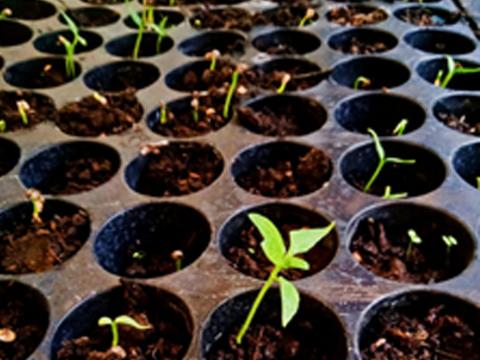The tallest seedling, with a height over an inch, was the first one to sprout and was among the seeds soaked in water for 24 hours.
BRGY. LIBERTAD, Butuan City – Two months ago when I was bored at home due to the quarantine measures, I decided to start gardening by growing bell peppers and tomatoes. I had 1 packet each of bell pepper and tomato seeds that had been untouched for so long. So I thought it was the right time to use it. I checked the expiry date and found out it was still okay so I started placing the seeds in my Do-It-Yourself paper pots. After a few days my tomato seeds started germinating. But my luck stopped there because when I checked my bell peppers, the seedlings did not emerge. For weeks of waiting not a single seed, out of the hundred, has sprouted. It laid dormant despite the same amount of care I devoted to my tomatoes. I wondered why. Did I sow it the wrong way? I was pretty sure it had the right environmental conditions such as temperature, water, oxygen, etc. So what happened?
I asked my colleagues what caused the poor germination of my seeds. First, they said some brands produce low-quality seeds. Many farmers can attest to this that is why they don’t buy the cheaper brands because sometimes quality is compromised. Two, when seeds are stored incorrectly their viability also weakens. Make sure that seeds are stored within the right temperature and avoid exposing them in high temperatures during transit to your garden or your home. Three, some species have lower germination rates than others. This is especially true with bell peppers because their seeds have high oil content and are thickly coated. That is why when birds feast on them, they simply pass the avian digestive system unharmed.
So what will I do now? Should I throw away the remaining seeds in the packet? “Not immediately,” my friends said. They told me three tricks of applying moisture to the seeds to soften its hard coat. Trick no. 1 was to wet a clean cloth, place the seeds there, fold the cloth making sure the seeds are fully covered by the damp cloth, then store it in a dark and cool area. I didn’t try this because I already experienced this during our science class back in my elementary days. I was more curious about tricks no. 2 and 3 which inspired me to make a comparative study on the germination rate and efficiency of the two.
Trick no. 2 was soaking the seeds for 24 hours before sowing. Trick no. 3 is what locals call “Pinakurat” style. This is putting the seeds in a clean cloth and dipping it in hot water for a few seconds just like how you dip your teabag down the warm cup of water. The only difference is, the cloth with the seeds inside, must be dipped quickly to avoid damaging the seeds. Old folks practice this trick but some agriculturists find it debatable. Nevertheless, I tried both tricks. I got my seedling tray filled with garden soil. The left half was planted with seeds that were soaked overnight with water. The right half was for the “Pinakurat” seeds. Several days later three seeds under Trick no. 2 started to germinate while all “Pinakurat” seeds just laid dormant. All the while I thought the “Pinakurat” was a total failure. But I was wrong. On the second week, many of its seeds began to sprout. After three weeks, both tricks turned out to be doing well. Those seeds soaked overnight or Trick no. 2 had a germination rate of 62.5%. The “Pinakurat” seeds, surprisingly, also had 62.5%! It was almost a tie except that the two tallest seedlings were under Trick No. 2, meaning germination is faster for those seeds soaked overnight in water as compared to those quickly dipped in hot water.
Please note that this conclusion of mine is based only on the garden trial I did at home. Other factors may have contributed to the seed germination rate and efficiency of my bell peppers. I would be glad if there will be similar studies that will be done in the future to prove or disprove the effectiveness of the “Pinakurat” style in seed germination.

